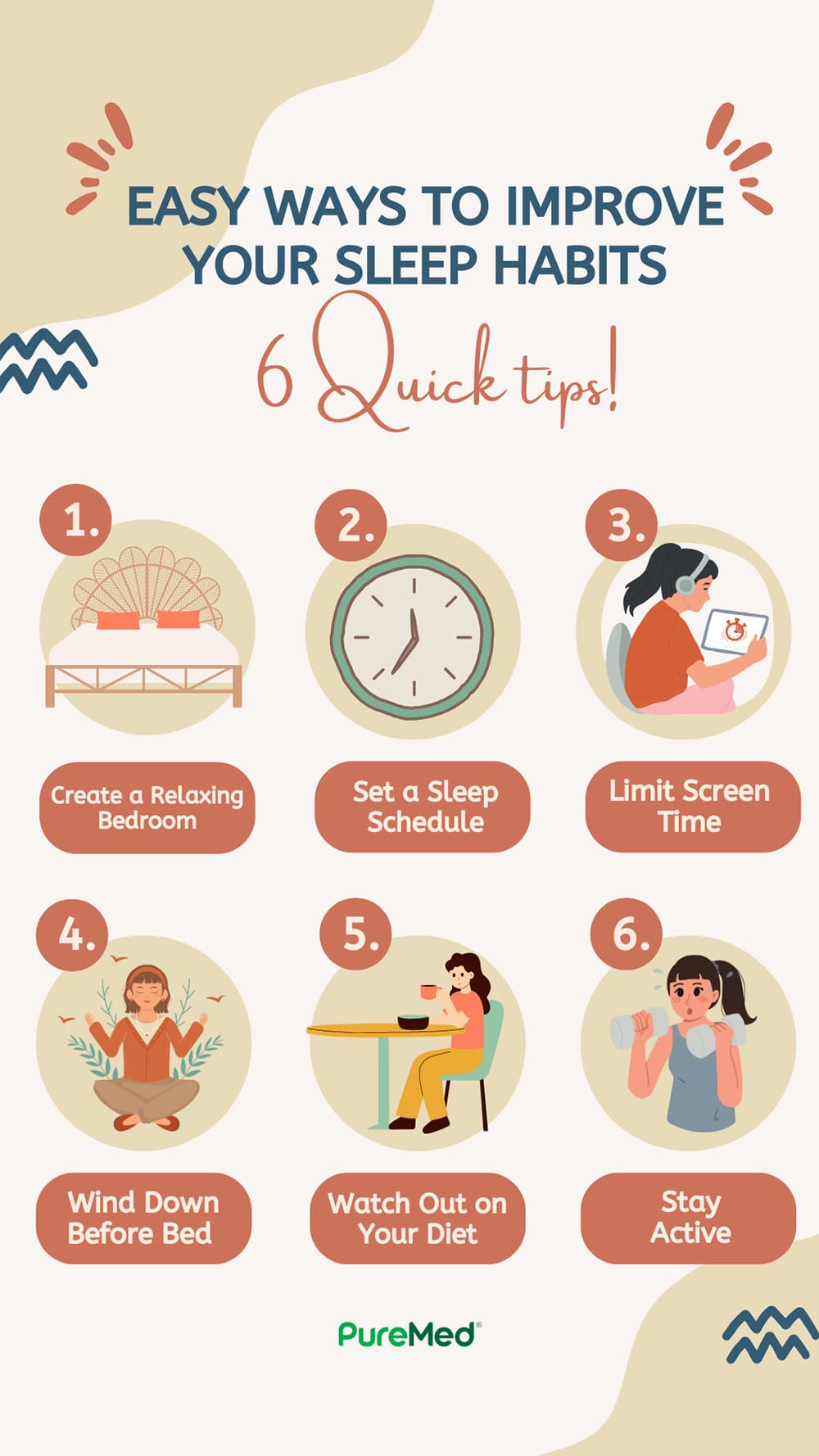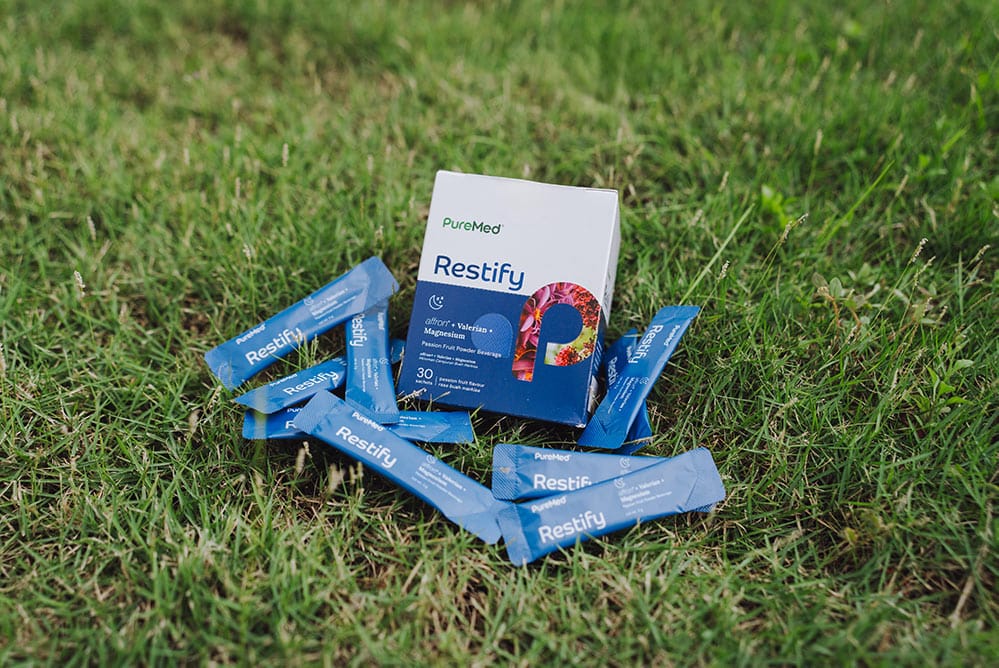No products in the cart.
Health Guides
Cognitive Wellness
Sleep Smarter: Tips and Tricks for a Healthier Night’s Rest


6 quick tips to help improve our sleep quality
Are you struggling with fatigue and restlessness? Do you often find yourself tossing and turning, only to wake up feeling more exhausted than when you went to bed? You’re not alone in this experience. In today’s fast-paced world, many people struggling with sleep-related issues, whether it’s the result of stress, technology distractions, or simply a busy lifestyle.When we don’t get enough restorative sleep, it can leave us feeling irritable, unfocused, and unable to fully engage in our daily lives. The good news is that there are effective strategies you can implement to enhance your sleep quality.
In this article, we will explore practical tips and techniques to help you sleep smarter, allowing you to wake up feeling refreshed and ready to tackle the day ahead. Let’s dive in!
- Create Your Very Own Sleep Sanctuary 🛏️
First things first, let’s talk about your bedroom. Is it a calming space or a chaotic mess? Your environment plays a crucial role in how well you sleep. [1,2] A relaxing and conducive bedroom can significantly improve your overall sleep quality. Here are a few quick fixes to consider:- Darkness is Key
Aim to create a dark environment by using blackout curtains or an eye mask. Darkness signals to your body that it’s time to rest and can help increase melatonin production, the hormone that regulates sleep. If outside light disrupts your sleep, blocking it out will help you fall asleep faster and stay asleep longer. - Cool It Down
Sleeping in Malaysia’s hot and humid weather can be challenging. While running the air conditioner all night offers relief, it can also be expensive. To save on costs, consider using air conditioner timers and energy-saving modes. Setting a timer allows the AC to cool your room for a few hours before turning off, ensuring comfort while reducing electricity bills. We can also consider opening the windows and turning on a fan to promote air circulation. - Quiet, shhhh:
If you live in a noisy area, consider using earplugs or a white noise machine to drown out disruptive sounds. Soft ambient noises can create a soothing atmosphere, making it easier for your mind to relax and drift off to sleep.
- Darkness is Key
- Set a Sleep Schedule ⏰
Consistency is your friend when it comes to sleep! Going to bed and waking up at the same time every day helps regulate your body’s internal clock, making it easier to fall asleep and wake up naturally. [1,2] Here’s how to establish a sleep schedule:- Choose Your Hours
Determine how many hours of sleep you need (most adults require about 7-9 hours) and set a consistent bedtime and wake-up time. This regularity helps reinforce your body’s natural sleep-wake cycle. - Stick to It
Even on weekends, try to maintain your sleep schedule. While it can be tempting to sleep in on days off to replace the hours lost on our workdays, that’s not how things work. Sticking to your routine will help you feel more rested during the week.
- Choose Your Hours
- Limit Screen Time 📱
In our digital age, it’s easy to get caught up in scrolling through social media from instagram, facebook, tiktok to binge-watching shows late into the night. However, excessive screen time before bed can disrupt your sleep. [1,2] Here are some strategies to help manage your screen time:- Screen-Free Zone
Try to avoid screens (phones, tablets, TVs) at least 30 minutes before bed. The blue light emitted by these devices can trick your brain into thinking it’s still daytime, making it harder to fall asleep. - Read a Book
Instead of screens, consider switching to a physical book or listening to calming music. Reading can be a relaxing way to transition into sleep mode and allows your mind to unwind.
- Screen-Free Zone
- Watch What You Eat and Drink 🍽️
Your diet can have a significant impact on your sleep quality. [1,2] Consider these dietary tips for a better night’s rest:- Mind the Caffeine
Try to avoid caffeine in the afternoon and evening. Instead, opt for herbal teas, such as chamomile or peppermint, which can promote relaxation and prepare your body for sleep. -
Don’t Overeat
Eating a large meal right before bed can lead to discomfort and disrupt your sleep. Aim to finish eating at least two to three hours before you sleep, allowing your body time to digest properly.
- Mind the Caffeine
- Wind Down Before Bed 🌜
Establishing a relaxing bedtime routine is essential for signaling to your body that it’s time to sleep. [2] Consider incorporating these activities into your nightly routine:- Take a Warm Bath
Soaking in warm water can help relax your muscles and calm your mind, making it easier to transition into sleep. The drop in body temperature after exiting the bath can also promote feelings of drowsiness. - Meditate or Stretch
Spend a few minutes meditating or doing gentle stretches. These practices can help clear your mind and relieve any physical tension, allowing you to settle into a more restful state
- Take a Warm Bath
- Get Moving! 🚶♂️
Regular exercise is not just beneficial for your physical health; it can also improve your sleep quality. [1,2] Here’s how to incorporate movement into your routine:- Aim for 30 Minutes
Try to engage in at least 30 minutes of moderate exercise most days of the week. This can include activities like walking, biking, or dancing—anything that gets your heart rate up and your body moving! - Timing Matters
While exercise is beneficial, be mindful of when you work out. Avoid vigorous workouts right before bed, as they might energize you instead of calming you down.
- Aim for 30 Minutes
Take a moment to look around your bedroom. What’s one thing you could change to make it more relaxing? Whether it’s decluttering your space or adding a few calming decorations, small changes can lead to significant improvements in your sleep environment.
Grab your phone and set a daily reminder for bedtime. This can help prompt you to start winding down and ensure that you give yourself enough time to relax before falling asleep.
Challenge yourself to a “screen-free night” this week. Pay attention to how you feel the next day—do you notice a difference in your energy and mood?
Keep a food diary for a week to track your eating habits. Look for patterns that might correlate with your sleep quality—are there certain foods or drinks that keep you awake?
Try creating your own bedtime routine that includes activities you find enjoyable and calming.
Exercising together with your friends and family can make it more enjoyable and help stick to your fitness goals!
Ready to Sleep Smarter?

Restify: A Natural Solution to Quality Sleep and Sleep Deprivation
These tips are just the beginning of your journey to better sleep! If you’re serious about getting a good night’s rest, consider trying Restify—a natural sleep supplement, specially designed to enhance your sleep experience. With natural ingredients such as Affron®, magnesium glycinate, and L-theanine, these ingredients can help to improve sleep quality, elevate mood, and relax the nervous system. These ingredients are scientifically backed and well studied to improve our sleep without causing any dependency. With just 1-2 sachets before sleep, it can help you wake up feeling rejuvenated the next day.
✨ Try Restify today and take the first step toward sleeping smarter here : https://puremed.com.my/product/restify/✨
Remember, improving your sleep takes time and effort, but with these simple changes, you’ll be well on your way to a healthier night’s rest. Sweet dreams! 💤
Reference:
- American Sleep Association. (n.d.). Sleep environment. https://www.cdc.gov/sleep/about/?CDC_AAref_Val=https://www.cdc.gov/sleep/about_sleep/sleep_hygiene.html
- Centers for Disease Control and Prevention. (2021). Sleep hygiene tips. https://sleepdoctor.com/sleep-hygiene/sleep-tips/
Recommended Articles
Join Our Newsletter
Sign up now to receive the latest news and promotions.
Shop
Learn
Support
KKLIU: 2136/2022 © 2023 PureMed. All rights reserved.

